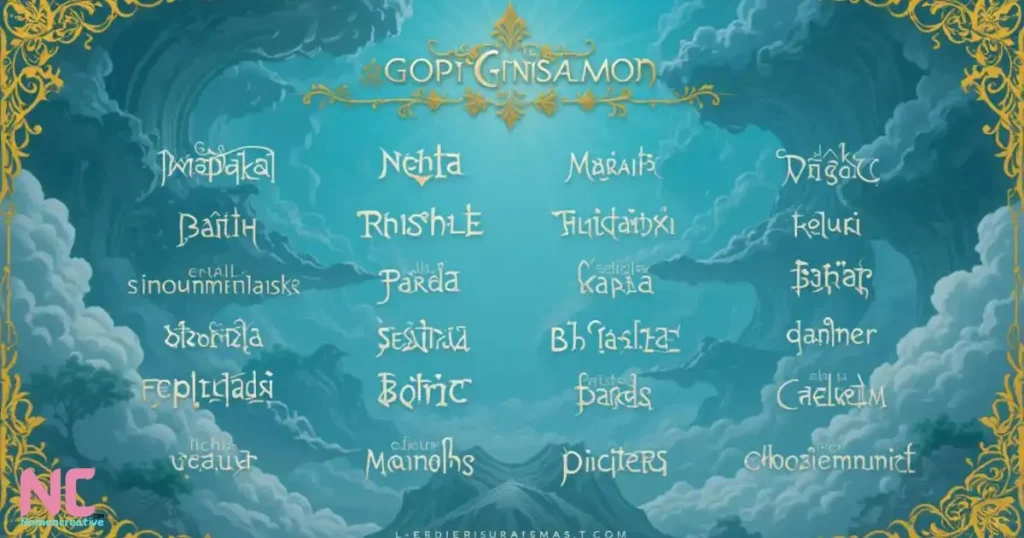“The perfect name to embody the power and grace of the divine.”
Names hold immense power, especially when they are associated with gods, deities, and mythological beings. Throughout history, humans have revered powerful figures whose names have shaped cultures, religions, and traditions. A god name isn’t just a word, it’s a symbol of strength, wisdom, creation, and divine authority.
For many, choosing a god name is about finding a connection to a higher power, an energy that resonates with one’s soul. In this guide, we will explore over 175 god names, each with its own unique meaning and mythology, to inspire those looking for a powerful name with deep spiritual significance.
Looking for the right name for a character, a pet, or even a spiritual journey? Our God Names Generator has got you covered. Whether you’re inspired by ancient Greek, Norse, or Hindu gods, or prefer a more abstract, modern interpretation, you’ll find names that evoke power and majesty.
You’ll discover the meanings behind these names, helping you choose one that resonates deeply with your intentions. Let these names remind you of the energy and power that comes with a well-chosen, mythical name.
This article aims to help you choose from a variety of godly names each one rooted in mythology and associated with traits like strength, wisdom, justice, and creativity. We’ve curated a list of 175+ god names from diverse cultures around the world, each with its own unique meaning and significance.
Use this list as a resource for inspiration, whether you’re naming a character in a story, looking for a meaningful name for a spiritual project, or simply fascinated by the divine.
Choose a Name
Before diving into the list of god names, it’s important to understand the significance behind each name. The name you choose will shape the identity of the character, entity, or concept it represents. A god name is more than just a label—it’s a representation of divine power, protection, wisdom, or creation.
Think about the qualities you want the name to embody. Do you want a name that conveys strength and valor or one that represents wisdom and mysticism?
Consider the mythology and culture from which the name originates. Each culture has its own set of gods, each with specific attributes and symbolism. By selecting a name with a strong connection to its mythology, you can bring depth and meaning to the identity it represents. Whether you’re seeking ancient, modern, or abstract names, take your time to connect with the energy behind the name.
Why Choose a Name?
Choosing a good name can be a deeply personal experience. It allows you to connect with the divine and imbue your character or entity with traits of the gods, such as wisdom, courage, or justice. The right name can serve as an empowering symbol, reminding you of the qualities you aspire to embody or the power you wish to invoke.
Some names carry the weight of ancient mythology, while others have evolved into modern representations of deities and higher powers. The choice of a god name gives you the opportunity to link yourself or your creation to a rich legacy of mythology and spiritual significance. By selecting a name that resonates with your values, you can deepen your connection to its meaning.
List mythical and powerful ideas
- Greek God Names
- Roman God Names
- Norse God Names
- Egyptian God Names
- Hindu God Names
- Other Mythical God Names
1. Greek God Names
Greek mythology is full of powerful gods, each with their own domains and symbols. Here are 25 names that are deeply rooted in Greek mythology.
- Zeus: God of the sky and thunder, ruler of Mount Olympus.
- Apollo: God of the sun, music, and prophecy.
- Athena: Goddess of wisdom and war.
- Hermes: Messenger god, god of commerce and travel.
- Ares: God of war and violence.
- Poseidon: God of the sea and earthquakes.
- Hera: Queen of the gods, goddess of marriage.
- Demeter: Goddess of the harvest and agriculture.
- Artemis: Goddess of the hunt and the moon.
- Hades: God of the underworld.
- Hephaestus: God of fire, metalworking, and craftsmanship.
- Persephone: Goddess of spring and queen of the underworld.
- Dionysus: God of wine, revelry, and theatre.
- Hestia: Goddess of the hearth and home.
- Nike: Goddess of victory.
- Eros: God of love and attraction.
- Gaia: Personification of the Earth.
- Hecate: Goddess of witchcraft, magic, and the night.
- Thanatos: God of death.
- Chronos: God of time.
- Pan: God of the wild, shepherds, and flocks.
- Helios: God of the sun.
- Hypnos: God of sleep.
- Nemesis: Goddess of revenge and retribution.
- Selene: Goddess of the moon.
Meaning: Each of these names represents a unique aspect of life or nature, such as wisdom, war, love, and the elements.
Interpretation: The names are connected to their domains of influence, embodying the traits or powers associated with those gods or goddesses.
2. Roman God Names
Roman mythology shares many similarities with Greek mythology, but the gods and goddesses often have different names and attributes.
- Jupiter: King of the gods, god of the sky and thunder.
- Mars: God of war.
- Venus: Goddess of love and beauty.
- Minerva: Goddess of wisdom, arts, and warfare.
- Neptune: God of the sea.
- Juno: Queen of the gods, goddess of marriage and childbirth.
- Ceres: Goddess of agriculture.
- Vesta: Goddess of the hearth and home.
- Mercury: God of commerce and communication.
- Apollo: God of the sun, music, and prophecy.
- Diana: Goddess of the hunt and the moon.
- Bacchus: God of wine and revelry.
- Pluto: God of the underworld.
- Saturn: God of time and harvest.
- Uranus: God of the sky.
- Hercules: Heroic demigod known for strength.
- Cupid: God of love and desire.
- Fortuna: Goddess of luck and fortune.
- Sol: God of the sun.
- Proserpina: Goddess of spring and queen of the underworld.
- Janus: God of beginnings, transitions, and doors.
- Vulcan: God of fire and metalworking.
- Faunus: God of the forest and animals.
- Fama: Goddess of rumor and reputation.
- Consus: God of harvest and grain.
Meaning: These names reflect the Roman adaptation of their gods and their influence on agriculture, love, war, and more.
Interpretation: The Roman gods have a more practical approach, often emphasizing society, agriculture, and the state.
3. Norse God Names
Norse mythology introduces gods and goddesses tied to war, wisdom, and fate, from the Vikings’ tales of Asgard.
- Odin: All-father, god of wisdom, war, and poetry.
- Thor: God of thunder and storms.
- Loki: God of mischief and chaos.
- Freya: Goddess of love, beauty, and fertility.
- Tyr: God of war and justice.
- Baldur: God of light, purity, and beauty.
- Frigg: Goddess of marriage and motherhood.
- Heimdall: Guardian of the gods and protector of the Bifrost.
- Njord: God of the sea and winds.
- Skadi: Goddess of winter, hunting, and skiing.
- Hel: Goddess of the underworld.
- Valkyries: Female figures who choose those who will die and those who will live.
- Frey: God of fertility, prosperity, and peace.
- Bragi: God of poetry and music.
- Idunn: Goddess of youth and immortality.
- Sif: Goddess associated with earth, fertility, and the harvest.
- Hela: Goddess of death and ruler of the underworld.
- Aegir: God of the sea.
- Ran: Goddess of the sea and wife of Aegir.
- Víðarr: God of vengeance.
- Forseti: God of peace and justice.
- Tyr: God of justice and law.
- Snotra: Goddess of wisdom and elegance.
- Alfheim: Home of the light elves.
- Svartálfar: Dark elves from the underworld.
Meaning: Norse gods are often associated with natural forces, wisdom, and fate.
Interpretation: These names represent traits of leadership, protection, and conflict.
Related Post:Fox-Inspired Japanese Names – Clever and Cute Choices
4. Egyptian God Names
Egyptian mythology is filled with gods that govern aspects of life and death, as well as creation and destruction.
- Ra: Sun god and creator of life.
- Osiris: God of the underworld, resurrection, and life after death.
- Isis: Goddess of magic, healing, and protection.
- Horus: God of the sky, kingship, and protection.
- Anubis: God of mummification and the afterlife.
- Set: God of chaos, storms, and destruction.
- Thoth: God of wisdom, writing, and magic.
- Bastet: Goddess of cats, home, and fertility.
- Sekhmet: Goddess of war, healing, and destruction.
- Hathor: Goddess of love, motherhood, and joy.
- Ptah: Creator god, god of craftsmen and architects.
- Sobek: God of crocodiles, strength, and protection.
- Ma’at: Goddess of truth, balance, and order.
- Nephthys: Goddess of night, death, and mourning.
- Khnum: God of the Nile and creation.
- Tefnut: Goddess of moisture and rain.
- Nut: Sky goddess and mother of the stars.
- Geb: God of the Earth.
- Serapis: God of healing and resurrection.
- Maat: Goddess of justice and truth.
- Imhotep: God of medicine and architecture.
- Khepri: God of the morning sun.
- Amun: King of the gods, god of the air and invisibility.
- Horus: God of kingship and war.
Meaning: Egyptian gods often represent aspects of life, death, and the cosmos.
Interpretation: Their names are symbolic of the forces governing the universe, creation, and protection.
5. Hindu God Names
Hinduism has a vast array of gods and goddesses that reflect different aspects of life, from creation to destruction.
- Brahma: Creator of the universe.
- Vishnu: Preserver of the universe.
- Shiva: God of destruction and transformation.
- Lakshmi: Goddess of wealth, fortune, and prosperity.
- Saraswati: Goddess of wisdom, knowledge, and arts.
- Ganesha: God of wisdom, remover of obstacles.
- Hanuman: God of strength and devotion.
- Krishna: God of compassion, tenderness, and love.
- Durga: Goddess of war and protection.
- Kali: Goddess of destruction and transformation.
- Indra: King of gods, god of thunder and rain.
- Indra: God of fire.
- Surya: Sun god.
- Varuna: God of water and the oceans.
- Yama: God of death and the underworld.
- Kubera: God of wealth and treasures.
- Rama: Incarnation of Vishnu, hero of the Ramayana.
- Parvati: Goddess of love and devotion.
- Shakti: Goddess of power and energy.
- Vayu: God of wind.
- Skanda: God of war.
- Brahmani: Goddess of creation and motherhood.
- Vishvakarman: Architect of the gods.
- Ayyappa: God of celibacy and renunciation.
- Narasimha: Lion-headed avatar of Vishnu.
Meaning: Hindu gods and goddesses represent every facet of existence, from creation to destruction, and reflect cosmic balance.
Interpretation: These names often symbolize divine energy and qualities of protection, love, and transformation.
6. Other Mythical God Names
Beyond the major mythologies, there are countless other gods and goddesses from various cultures.
- Quetzalcoatl: Aztec god of wind and learning.
- Shiva: African god of creation and destruction.
- Coyote: Native American trickster god.
- Pachamama: Inca goddess of the earth.
- Maui: Polynesian god of the sun and mischief.
- Tlaloc: Aztec god of rain and fertility.
- Ix Chel: Mayan goddess of the moon and love.
- Tezcatlipoca: Aztec god of night and sorcery.
- Hecate: Greek goddess of witchcraft.
- Ymir: Norse primordial giant.
- Cernunnos: Celtic god of fertility.
- Astarte: Phoenician goddess of fertility and love.
- Marduk: Babylonian god of creation and judgment.
- Enki: Sumerian god of water and wisdom.
- Raijin: Japanese god of thunder.
- Amaterasu: Japanese sun goddess.
- Epona: Celtic goddess of horses and fertility.
- Lugh: Celtic god of light and crafts.
- Tiamat: Babylonian goddess of chaos.
- Anu: Mesopotamian god of the heavens.
- Hades: Greek god of the underworld.
- Chicomecoatl: Aztec goddess of agriculture.
- Freyr: Norse god of fertility and prosperity.
- Shango: Yoruba god of thunder.
- Nergal: Mesopotamian god of war and death.
- Sekhmet: Egyptian goddess of war and healing.
Meaning: These names come from cultures around the world, each representing the divine in its own way.
Interpretation: Each name carries a distinct cultural significance and often reflects unique aspects of the natural world or spiritual beliefs.
Coolest God Names from Mythology:
- Zeus (Greek) – King of the gods, thunder, and sky.
- Odin (Norse) – Allfather, god of wisdom, poetry, and war.
- Ra (Egyptian) – Sun god, creator, and ruler of the sky.
- Shiva (Hindu) – Destroyer and transformer, part of the Holy Trinity (Trimurti).
- Thor (Norse) – God of thunder, lightning, and protection.
- Anubis (Egyptian) – God of mummification, death, and the afterlife.
- Athena (Greek) – Goddess of wisdom, strategy, and war.
- Hades (Greek) – God of the underworld and the dead.
- Poseidon (Greek) – God of the sea, earthquakes, and horses.
- Loki (Norse) – Trickster god associated with mischief and chaos.
Greek-Inspired God Names for Worldbuilding:
- Aetheris – God of the upper air, light, and celestial beings.
- Thalassa – Goddess of the sea, inspired by the ancient Greek word for sea.
- Nyxos – God of the night, based on Nyx, the primordial goddess of the night.
- Phaeron – God of the dawn, inspired by the Greek personification of the early light.
- Aquilora – Goddess of winds and storms.
- Helion – God of the sun, derived from the Greek word for the sun (Helios).
- Eryxian – God of nature and fertility, inspired by Greek mythological figures connected to the earth.
- Chimerism – Goddess of dreams and illusions, inspired by the chimera.
- Morpheus – God of dreams, inspired by the ancient Greek god of the same name.
- Hyperiona – Goddess of the cosmos, inspired by the Greek Titan Hyperion.
Names for Gods and Goddesses:
- Icarus – God of ambition and flight.
- Valkyrie – Goddess of warriors and fate.
- Artemisia – Goddess of hunting and wilderness.
- Zephyros – God of the west wind and the spring breeze.
- Solara – Goddess of light and warmth.
- Orpheus – God of music, art, and poetic inspiration.
- Selene – Goddess of the moon and night.
- Astraeus – God of stars and planets.
- Isis – Goddess of magic, motherhood, and fertility.
- Erosia – Goddess of love, desire, and beauty.
Powerful God Names:
- Vishnu (Hindu) – The preserver and protector of the universe.
- Zeus (Greek) – The king of gods and god of thunder.
- Ra (Egyptian) – Sun god, creator of all life.
- Hercules (Greek) – Demigod known for immense strength and heroic deeds.
- Brahma (Hindu) – Creator god of the universe.
- Apollo (Greek) – God of the sun, prophecy, and healing.
- Poseidon (Greek) – God of the seas and earthquakes, holder of immense power.
- Anubis (Egyptian) – God of the dead, capable of guiding souls to the afterlife.
- Athena (Greek) – Goddess of wisdom, strategy, and war, known for her intelligence and power.
- Hades (Greek) – God of the underworld, ruler of the dead, and lord of the riches beneath the earth.
Final Thought
Choosing a god name is a powerful decision, as these names carry deep significance rooted in mythology and culture. Whether you’re looking for a name to inspire strength, wisdom, or protection, the names provided in this list offer a diverse range of options. Each name holds a unique meaning and can embody qualities that resonate with you or your creation.
The divine and mythical connections these names carry can infuse your journey with inspiration and power.

James Whitman (Admin)
The cornerstone of innovation and leadership! As the admin of NomenCreative, James ensures smooth operations while driving the team to explore uncharted naming territories. His strategic vision shapes memorable names for babies, brands, and beyond.

